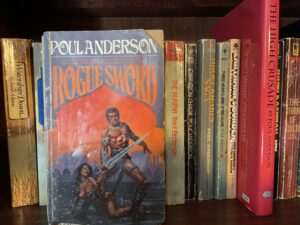
I picked up Poul Anderson’s Rogue Sword in a batch that also contained Clark Ashton Smith’s The Last Incarnation and Leigh Brackett’s The Coming of the Terrans. So, good company all around. Insofar as the book is historical fiction marketed as fantasy, it reminds me of Edgar Rice Burrough’s I Am a Barbarian. However, whereas ERB’s book is set in the period of the early Roman Empire, Anderson’s takes place primarily at the beginning of the Fourteenth Century AD. The tone is in some ways similar: both books take unflinching looks at the miseries and evils of the times in question, the slavery, savagery, superstition, and injustices. The greatest departure is, I think the main character. ERB’s narrator is, generally speaking, pure at heart, a noble barbarian. Anderson’s? Well, therein lies the tale.
The story commences in a fashion that suggests we are in for a picaresque. Lucas Greco, in classic roguish fashion, escapes from a woman’s boudoir in Venice, diving into a canal a step ahead of a furious husband. He’s just a lad. He needs to flee Venice. So much for the prologue, though in Anderson’s hands it is turns out to be much more than a jumping off point. As the story progresses (picking up fourteen years later) it becomes increasingly obvious that it is not a picaresque. Instead it is a semi-tragic story of a man whose troubles result from his own sins. In this case the peccadillo in question is a pronounced tendency to satyriasis. Consensual, at least: he’s a tomcat, not a rapist. But Lucco — or Lucas, as circumstances warrant — cannot keep it in his pants. Everything that follows (commencing with his Venice fling) is a result. This is a classic example of character driving plot.
Lucas is at heart a good man, searching for meaning and trying to find a home. He’d spent half his life traveling, having adventures (and meeting women), getting as far as Cathay, where he spent a considerable time as a guest of the Khan. Now back in the crumbling Byzantine Empire, he inadvertently rescues a Circassian slave girl and his past catches up with him. He becomes part of a mercenary company, the Grand Catalan Company, and experiences the horrors involved in indiscriminate warfare, raiding, and the sacking of towns. Anderson shows his research, providing details of a relatively little known facet of the history of the Middle Ages. Lucas is a reluctant participant, and Anderson does an excellent job recounting Lucas’ rationalizations, qualms, and justifications.
Becoming involved with yet another woman (despite his continuing possession of/dalliance with the infatuated Circassian) leads to yet more complications: violent, deadly complications, written with a good eye for period equipment and tactics. Lucas is required to make hard choices, especially hard choices when doing the right thing requires betrayal of the closest thing to a father he has.
Anderson doesn’t flinch. He shows the filth and ugliness along with the excitement and adventure. That is, I think, the factor that elevates Rogue Sword above a run-of-the-mill historical adventure.
If you are in the mood for gritty adventure, give the Falchion’s Company series a try, available in print, digital, and audio formats. I may even have some audio book promo codes available, if you’d like to listen for free.

2 comments
It is a great novel. I could not put it down when I first read it. Anderson’s other Avon paperback historical THE GOLDEN SLAVE is worth reading also.
I will keep an eye out for that one.